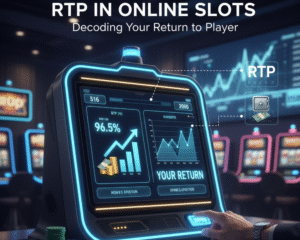Total Gambling Activity, but No Indication of Increase in Problematic Online Gambling Modalities Intensity During the First Phase of the COVID-19 Outbreak in Sweden: A Time Series Forecast Study
Introduction: Online Gambling Modalities
The COVID-19 outbreak will likely have a public health impact beyond immediate disease transmission. Little is known about whether social distancing and other societal changes has provoked an increase in gambling, whether decreased betting opportunities due to paused sports events spurred gamblers to transition to online casino gambling, or whether any of these factors have had an impact on problem gambling.
Methods: Data on lookup queries against the Swedish Gambling Paus registry, logging all initiated gambling sessions by all licensed gambling providers, from 2019-01-01 (start of registry) to 2020-04-08 (well into the first phase of the outbreak) were analyzed using TBATS time series forecasting to estimate trends after the first domestic COVID-19 death. Obfuscated data on daily total wagered and deposited OzwinCasino.com amounts, split by modality (casino or betting, and low and high intensity, respectively) for the equivalent period were supplied by a licensed online gambling provider.
Results:
Total gambling activity decreased by 13.29% during the first phase of the outbreak compared to forecast. Analyses of online gambling data revealed that although betting decreased substantially in synchrony with a slight increase in online casino gambling, there was no increase in likely problematic, high-intensity gambling and neither did total online gambling increase.
Conclusions: This first, preliminary study revealed no increase in Swedish gambling activity, total or specifically online, in the first phase of the COVID-19 outbreak. Future research should examine whether pandemic-induced transitioning between gambling modalities and/or increased participation in gambling, leads to long-term effects on prevalence of problem gambling.
Introduction
The ongoing COVID-19 pandemic is estimated to have claimed over 600,000 lives. Including over 5,600 lives in Sweden at time of writing in late July. And led to unprecedented global societal changes. With no pharmacological treatment or vaccine currently available. Many countries have implemented regional or national quarantine procedures or encouraged other forms of social distancing strategies to curb. The continued spread of the virus. Although burgeoning research supports. The efficacy of social distancing strategies in combatting. This pandemic, such measures are likely to also have a public mental health impact beyond. The immediate effects on SARS-CoV-2 transmission.
In Sweden, public concerns were raised at an early stage of the outbreak. That social distancing has increased gambling activity and possibly. The prevalence of problem gambling, inciting the Swedish government to introduce temporary legislation (a decree, 2020:495) to the Swedish gambling market. That includes a deposit limit on online casinos of 5,000 SEK per week (per gambling provider) and obligatory duration limits.

Similar actions were taken in other countries with regards to gambling.
The exact rationale and supporting evidence for. This new Swedish legislation was not publicly disclosed and gambling providers reacted by raising. The concern that these measures may disturb. The delicate balance on the Swedish gambling market by channeling problem gamblers from license. Providers with responsible gambling obligations, to non-license. providers lacking such obligations. At the time of this political decision, there was no published study on. The effects of the COVID-19 outbreak on gambling.
The extant literature did show that both anxiety and boredom are associated with problem gambling. Both of which can be expect to increase during. Uncertain and threatening times and in connection with social distancing procedures introduced to curb disease transmission . OzwinCasino.com Previous research on the impact of economic recessions (burgeoning cases of which can already be seen following COVID-19 outbreaks). On gambling does however suggest a more complex association such. That gambling may increase (particularly amongst those economically affected) but not necessarily gambling problems.
Moreover, specific to pandemics, – Online Gambling Modalities
the same social distancing phenomena. That may increase some types of gambling likely have opposite effects on other types: pausing sport events means. That there are fewer possibilities for betting, and closing physical casinos, bingo halls. And restaurants and clubs with slot machines, obviously reduces. These types of gambling. Beyond investigating change in total gambling activity. Studying such transition effects is another important research question. Since it is well-establish that different gambling modalities. Are associate with different risks for developing gambling problems, both empirically and theoretically.
At time of writing, four studies have examined. The impact of the COVID-19 outbreak on gambling: three cross-sectional survey studies and one using aggregated. Time series from a multinational gambling provider. Two deserve special mention in the context of the current study. The time series study used behavior tracking data from gamblers in Sweden, Germany, Finland, and Norway (not taking different pandemic development courses into account) and found not only. The expected substantial decrease in betting activity during.
The first phase of the COVID-19 pandemic,
but also that the percentage of previously active betters who also played casino games decreased from pre-pandemic levels, i.e., no evidence of gamblers transitioning between modalities. A population survey study conducted in Sweden found that only 4% of gamblers reported gambling more during the COVID-19 crisis, 51% reported no difference and seven percent reported gambling less (the remaining percentage did not gamble), only a few percentages of whom transitioned to other gambling modalities. Gamblers who reported increased gambling, and those who transitioned to other modalities.
Were, however, more likely to have gambling problems. Importantly, without longitudinal data, or reliable and applicable stability estimates. One cannot say that the proportion. Who report an increase or decrease in gambling is higher than what would be naturally expect. Further, the so called total consumption model (applicable to many regulated commodities) predicts a strong correlation between total population consumption and prevalence of excessive and problematic consumption, and there is robust evidence supporting the applicability of the total consumption model to the gambling field. Thus, the trend in total gambling activity following a pandemic remains. A meaningful indicator and more research is need to examine trends at both population- and subgroup-level, and split by gambling modality.
In the current study – Online Gambling Modalities
we used two unique datasets to examine whether the first phase of the COVID-19 outbreak in Sweden. Was associate with an increase in overall gambling. Activity on a population level, whether high-intensity online gamblers. Were particularly affect, and whether online gamblers transition between gambling modalities. First, we used lookup-query data from. The Swedish Gambling Authority’s account database to estimate change in total gambling activity during. The first phase of the outbreak.
Since determining trends require a meaningful reference. Several comparison trends were calculate to provide. A robust measure of relative change, including from advanced time series forecasting with sliding-window sensitivity analysis. Second, aggregated data on daily amounts wagered and deposited at a large. Licensed online gambling provider, split by gambling modality and gambling-intensity (respectively). Allow us to examine change in gambling patterns amongst high-intensity vs. low-intensity online gamblers. As well the extent of gamblers transitioning between gambling modalities.
Methods and Materials
Ethics and Study Design
Since the current study uses only aggregated data sets and did not involve research on individually. Identifie human participants (relying only on population aggregated data). This study falls outside the applicability of the Swedish Act concerning. Ethical Review of Research Involving Humans, and no independent ethical review is thus require. One of the datasets is publicly available through a freedom of information request to the Swedish Gambling Authority. And secrecy as extend by the Swedish Public Access to Information and Secrecy Act (SF 2009:400).
Setting and Data
Recent survey research suggests that around 0.6% of the Swedish population. Age 16−87 are problem gamblers according to the PGSI definition and scoring interval. That an additional 3.6% present low-to moderate risk gambling. That online gamblers are overrepresent amongst problem gamblers, and that the prevalence of last-year online gambling increase slightly from 2015 to 2018, from 18 to 21% Since 2018, Sweden has had a regulate gambling market with licensed gambling providers Since January 1st 2019.
There is a formal Gambling Pause registry host by the Swedish Gambling Authority, available for anyone to use to exclude themselves from any type of license gambling for 1, 3, or 6 months, or until further notice. As a prerequisite for a license, gambling providers are require to have gamblers identify themselves to initiate any kind of gambling session, both online and on-site. a positive lookup excludes the gambler from any gambling activity.
RELATED ARTICLE: 3 Tips to Choose a Good Online Casino
For the current study, the Swedish Gambling Authority provided data on number of logged lookup queries (i.e., attempted initiated gambling sessions) per day, from 2019-01-01 to 2020-04-08. For reasons unknown, the entry from 1 day (2019-06-10, well-before the original outbreak) was missing and replaced using trend interpolation from nearest neighbors, for a total of k = 464 entries. for observed time series along with TBATS-derived components; see below for details. The data exhibited a strong weekly trend, with gambling activity at its highest on Saturdays, as in other time series on direct measures of gambling activity. The included monthly trend adequately captured the payday phenomenon



